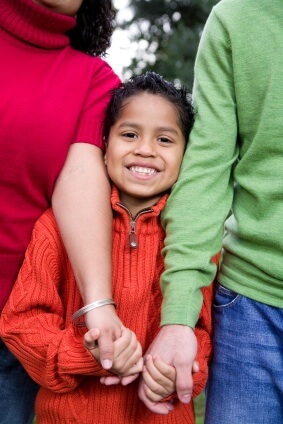“Unconditional love is love without requiring anything in return–love no matter what. Love never fails.” – Heather Forbes
We all know that children need unconditional love. And most parents DO love their children without reservation. After all, no matter how irritated we get with them, we know that we would throw ourselves in front of a bus to save our child’s life.
The problem is that unconditional love isn’t just what we feel. It’s what the object of our love feels. Does the child really feel that she is loved exactly as she is? That she doesn’t have to be, or do, anything in particular to earn our love? That even when she hurts her brother or spits at her mother or breaks our favorite mug on purpose, she is still loved?
And that’s the challenge for most of us. We certainly need to stop her from hurting, spitting, purposely breaking things. So we resort to punishment. After all, the child needs to learn a lesson.
But all punishment withdraws love from the child. If we hurt the child physically, obviously the child does not feel loved at that moment, no matter what we tell him. But even timeouts and parent-imposed consequences are seen by the child for what they are: intentionally causing emotional pain to force the child to comply.
Any time a human feels that another human is intentionally causing them pain, they don’t feel loved. And timeouts, in specific, are actually defined as “love-withdrawal” techniques, because they show the child that we are willing to withdraw our love when the child displeases us. It’s symbolic — we withdraw our love temporarily. But the lesson is not lost on the child. We could, at any time, stop loving them altogether.
This puts parents in a difficult position. Children do need our guidance. And yet unconditional love means the child feels the parent’s love without the requirement of the child doing anything at all — including behaving. How can we do both?
1. Stop punishing and start connecting.
A great deal of research shows that children who are disciplined with love withdrawal techniques, including timeout, misbehave more. We only punish because we don’t know what else to do. But there are thousands of families where children are never punished. Sure, their parents set limits. They spend a lot of time emotion-coaching. Those children not only “behave,” they seem to develop emotional intelligence and morality earlier than other children. There is no reason to punish, and every reason not to.(1)
2. Accept Feelings, Limit Behavior.
Empathy is unconditional love in action. Your child feels understood and accepted, even while his actions are contained. Reconnect, empathize, and invite him to trust you with the deeper feelings driving the behavior: “I won’t let you hit me. You must be very upset. What’s going on, Sweetie?”
Listen. Breathe. Teach emotional intelligence:
- “She knocked over your tower and you worked so hard on it, you’re mad!”
- “You’re so disappointed that we can’t stay and have dessert at the restaurant, huh?”
Remember,empathizing with his anger doesn’t mean you endorse his hitting. And acknowledging her strategy for meeting her need doesn’t mean you have to meet her need in the way she’s asking. For instance, some sweetness from you might meet the same need as that dessert.
And empathy doesn’t mean you don’t address the behavior. Later, when everyone is calm, reinforce any limits as necessary and talk about other ways to handle the situation: “I know it’s hard to stay calm when your sister knocks over your tower, but you know hitting hurts and it’s not okay. Next time, what could you do instead of hitting her? Let’s practice.”
3. See your child’s “transgressions” from your child’s point of view.
Naturally, we assume we’re right….which makes our child wrong. But we could see it another way, a way that is actually much closer to reality:
All “misbehavior” from your child is an SOS. Under your child’s misbehavior there is always a reason, an upset feeling or unmet need. Address that underlying reason, not the behavior, and you’ll see a change in your child — because you answered her SOS.
- Maybe he’d be nicer to his sister if he wasn’t worried that he’s lost his special place in your heart, and what he needs is more connection to you.
- Maybe she gets so involved in her play that she forgets all about the potty; you’ve been using one for years but this is all new to her — and it sure doesn’t seem as important as whatever she’s involved with at the moment. (Might be time to try one of those potty watches made for kids.)
- Maybe she’d stop arguing if you acknowledged her upset with empathy, so she didn’t have to shout to feel heard. (“I hear how disappointed you are about this, Sweetie…”)
- Maybe he needs your help to learn some better strategies to keep track of things so he doesn’t lose them.
When children act out, they’re telling us — in the only way they can at that moment — that they need our help. When we see things from our child’s point of view, misbehavior is suddenly comprehensible, forgivable. The blocks to love melt away, and our love becomes unconditional.
4. Manage Your Anger.
Did he hit his little sister? Did she scream “I hate you!” and slam the door? Did he throw a toy at your head? Did she throw a fit in the restaurant? It’s hard to feel love for our kids when they’re driving us crazy. So we lose it. Of course, we know we love them, no matter what. But if you ask the kid, he or she doesn’t feel loved at that moment.
“Of course!” we might say. “We WANT her to know how mad we are!! She can feel our love later!”
But will your rage really teach your child the lesson you want to teach? Love looks for solutions, not blame. When kids misbehave, the most effective intervention is setting a calm, clear limit and then loving our child through his upset. When we indulge our anger, we’re modeling inappropriate behavior for our child.
And kids do misinterpret our anger. At the best, they assume they’re bad people who can never be good enough. At worst, you’d be amazed how many young children secretly fear we’ll send them to jail or get a new kid.
5. Trust that once your child feels unconditionally loved, she will be able to change her behavior.
What if your child has crossed the line? Be brave. Don’t give in to your fear. Don’t give up on her. Go get her and bring her back into the embrace of your family. She’s disconnected right now, but when you love her unconditionally, you strengthen her belief in her own goodness, and help her grow into your trust.
Because the healing miracle of unconditional love is that there is no line. There is only love.
Heavy lifting? Yes. It does takes daily practice
to build this kind of heart muscle. But there’s nothing as rewarding. These five habits will bring you and your child closer, her behavior will improve dramatically, and for the rest of her life, she will know that she’s more than enough, exactly as she is. That’s being well and truly loved. Unconditionally.
***
Today is Step 9 of Ten Steps to Unconditional Love:
5 Secrets to Love Your Child Unconditionally
This series is designed to heal our ability to love unconditionally, so we can give our children the unconditional love they need. The first eight steps were:
1. Forgive yourself for not being perfect: Your 12 Step Program to Become a Recovering Perfectionist
2. Unconditional love is like a muscle. It needs a daily workout.
3. Want to wake up jazzed about the day ahead? Commit to radical self-care.
4. Are You Drinking Rat Poison? Heal Your Childhood.
5. Heal Your Heart, Heal Your Life
6.How To Love Unconditionally When You’re Angry
7. Don’t Get Hijacked by Emotion: Take the High Road
8. What If You’ve Made Mistakes As a Parent?
Our next post wraps up this series, and next week, we’ll be back to our regular parenting posts!
***
Footnote
1. Alfie Kohn, in his book Unconditional Parenting,cites numerous studies on the negative effects of timeout and other love-withdrawal techniques on children’s moral and psychological development, including the effect on morality and emotional intelligence. See also the article on Timeouts on this website.

Source: Aha! Parenting Blog






Leave Your Reply